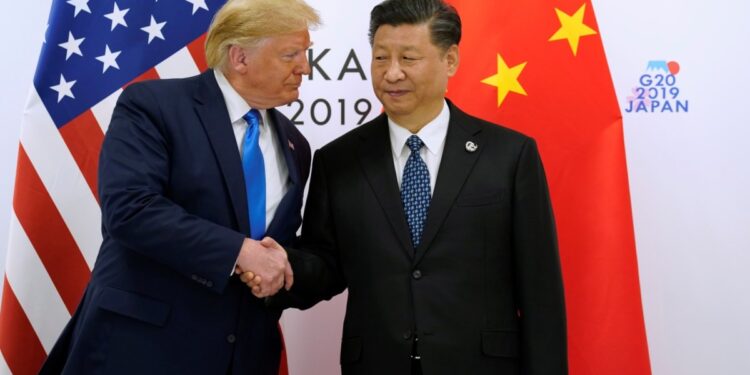On the day of his inauguration, US President Donald Trump ordered an investigation into trade between the United States and China, before yesterday, Tuesday, he repeated the threat to impose 10% tariffs related to the deadly opioid fentanyl, in a measure that seemed moderate, especially since the Chinese were prepared to hear bad news. Immediate customs duties of 60% on exports, according to the British Financial Times.
Despite this, Trump’s gesture was enough to put pressure on China’s stocks and currency; The CSI 300 index on the mainland fell 1% and the Hang Seng Index in Hong Kong fell 1.6% on Wednesday, while the yuan fell 0.25%.
Trump blames Canada and Mexico for the flow of drugs, and said before taking office that the tariffs he would impose would remain in place until these flows stopped.
Quieter steps
However, Trump’s first steps on China were less severe than the 25% tariffs he announced on US allies, particularly Mexico and Canada, and he also hinted at a possible broader deal linking tariffs to ownership of TikTok, the short-video platform it controls. China, which US security officials want to shut down.
Despite Trump’s penchant for outlandish statements and quick changes, this more flexible introduction is expected to have restored hope in Beijing that negotiations can be held to avoid a second trade war. The question now remains what kind of deal will be acceptable to both sides? The newspaper says.
Agreement possible
The Financial Times quoted a professor at the Institute of International Studies at Fudan University in Shanghai, Zhao Minghao, as saying: “There is a possibility that the two sides will be able to reach an agreement… You can feel there is cautious optimism… but we will need to know whether there is a good match between what… “Trump and Beijing can offer it to each other.”
Trump and Chinese President Xi Jinping held a phone call the weekend before the inauguration, their first in four years, which the US President described as “very good” and discussed “trade, fentanyl, TikTok, and many other topics.”
President Xi sent the most senior Chinese official ever to an American inauguration, Vice President Han Zheng, who also met with American business leaders including Elon Musk, who is close to Trump.
During his campaign, Trump pledged to impose 60% tariffs on China upon taking office, and later threatened to impose an additional 10% on day one to force Beijing to crack down on fentanyl primary drug flows.
Instead, on Monday, he issued a memorandum directing officials to investigate the US trade deficit and “recommend appropriate measures, such as global complementary tariffs or other policies, to address such deficits.”
study
He asked the US Trade Representative to study Beijing’s compliance with the “Phase One” agreement agreed upon during his first term as president, and to consider additional tariffs “particularly with respect to industrial supply chains and fraud through third countries,” a move with far-reaching implications for China.
Economists believe that part of China’s trade with the United States has been transferred through third countries to avoid tariffs since the first Trump administration’s trade war, and US officials are scheduled to present their findings on April 1.
Although Trump signed an order allowing TikTok to operate for 75 days, a shift from his first term, in which he sought to ban it from the United States, he also said that Beijing would need to allow a US entity to take over half the company or face tariffs. Customs duties up to 100%.
The tariffs were linked to the ownership of “Tik Tok” after statements made by Musk on Monday, in which he complained that while the former was allowed to operate in the United States, its social networking site “X” was blocked in China.
A source familiar with the matter in China said that Beijing may agree to sell ByteDance, owner of TikTok, as part of a broader deal that would cover a range of issues including trade, but the source indicated that any such discussions were at an early stage.
In recent days, Chinese officials, who have long opposed forced sales, have appeared more flexible in this regard.



